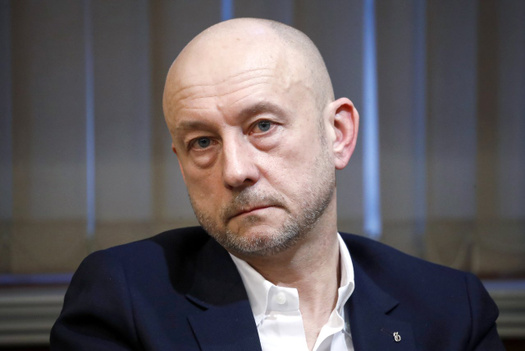
Two top Russian journalists are forced to quit, and an entire department follows
Мы говорим как есть не только про политику. Скачайте приложение.
On May 20, two top journalists at the Russian newspaper Kommersant announced their resignation. Special correspondent Ivan Safronov and editor Maxim Ivanov left the newspaper at the request of the company’s owner, Alisher Usmanov, after they published an article claiming that Russia’s Federation Council chairperson Valentina Matvienko might leave her post. Eleven other journalists, including Kommersant’s entire politics department, soon quit their jobs as well to protest the owner’s intervention.
In April, Kommersant published a story saying Valentina Matvienko might leave the Federation Council
On April 17, Kommersant published an article titled “They make speakers out of these people.” The piece indicated that Valentina Matvienko, the chairperson of the body that approves Russian federal laws, was scheduled to meet with Vladimir Putin during the month of May to discuss the possibility that she might leave her post. One of Kommersant’s sources said the likelihood that Matvienko would switch jobs was “extremely high.”
An anonymous high-ranking government official told Kommersant that Matvienko might take charge of Russia’s federal pension fund, potentially leaving her place in the Federation Council to Foreign Intelligence Service head Sergey Naryshkin.
The article’s byline listed five authors: deputy politics editor Maxim Ivanov, special correspondent Ivan Safronov, politics correspondent Natalya Korchenkova, economics correspondent Anastasia Manuilova, and economics editor Oleg Sapozhkov.
The independent television channel Dozhd published an article about the possibility of Matvienko’s resignation almost simultaneously. In Dozhd’s piece, a representative for Matvienko denied that she might leave her current position.
The journalists started facing internal pressure almost immediately
Sources familiar with the situation told Meduza that Kommersant’s owner, the billionaire Alisher Usmanov, began putting pressure on the newspaper’s journalists a few days after the article about Matvienko was released. The sources added that Valentina Matvienko herself was particularly dissatisfied with the piece. The senator’s press secretary said Matvienko would not be commenting on the article or on the shakeup at Kommersant.
One of Meduza’s sources indicated that, at first, the newspaper’s shareholders planned to fire editor-in-chief Vladimir Zhelonkin, who also serves as Kommersant’s CEO, in response to the article’s publication. However, they said, Zhelonkin managed to come to an agreement with the company’s shareholders. As a result, the shareholders decided to force out some of the journalists who wrote the article. “[We] tried for a long time to persuade the shareholders not to do this, but it didn’t work,” one of the journalists who subsequently quit in protest told Meduza.
On May 20, two of the article’s contributors, Maxim Ivanov and Ivan Safronov, wrote that they had been asked to leave Kommersant after coming to an agreement with the newspaper’s owners. Ivanov began working at Kommersant in 2009 as an intern and rose through the ranks to become a deputy section editor. Ivan Safronov also worked at the newspaper for about 10 years and was one of the newspaper’s leading reporters.
Both journalists emphasized that the decision to leave their jobs was made for them by Usmanov. Safronov added that the billionaire expressed “serious complaints” about the article in question, but he did not specify what those complaints were. Safronov declined to speak with Meduza directly; Ivanov said the newspaper’s leadership would be better equipped to comment on the details of the situation.
Kommersant’s editor-in-chief and CEO, Vladimir Zhelonkin, said he had made the decision to ask both journalists to leave on his own without interference from shareholders. “We parted ways with these journalists because Kommersant’s editorial standards were violated in the preparation of the article,” he told Vedomosti. In an interview with Meduza, Zhelonkin added that he saw the piece about Matvienko before it was published but discovered that editorial standards had been violated only after the fact. Zhelonkin did not specify which violations were commited (he declined to answer similar questions from Vedomosti and the BBC Russian Service). Zhelonkin also declined to comment on the reasons for the resignations of Kommersant’s other journalists.

A source close to Usmanov told The Bell that the politics department’s journalists had “screwed up and violated all the written and unwritten rules of journalism, ethics, and the company itself.” The source added that the journalists were offered a chance to correct their errors and did not take it. He also did not say what exactly their errors had been, but he indicated that they were unrelated to the contents of the article on Matvienko’s possible resignation. The Bell’s sources said Kommersant would soon release an official statement on the matter.
Kommersant’s entire politics department and a deputy managing editor followed Ivanov and Safronov out
In the hours after the two journalists announced their resignations, every journalist in Kommersant’s politics department followed suit. An announcement about their decision was made by deputy managing editor Gleb Cherkasov, who will also leave his post. “Our shareholder has the right to make staffing decisions, and our employees have the right to disagree with those decisions in the only way they can: finding a new place to work,” Cherkasov wrote. He declined to speak with Meduza. In total, 13 employees left Kommersant, including Ivanov and Safronov.
After the mass resignations at Kommersant became public, another deputy managing editor, Renata Yambayeva, wrote that the decision to let Ivanov and Safronov go was made by Alisher Usmanov personally, “carried out” by one of his representatives, and enforced by Vladimir Zhelonkin.
Yambayeva added that the newspaper’s other journalists had tried to defend Ivanov and Safronov but that “direct appeals to the shareholder and his representative” did nothing to help. The “representative” in question was Ivan Streshinsky, who holds a leadership role in Usmanov’s company, USM. Streshinsky did not answer Meduza’s calls, and other USM representatives had not released comments to Meduza by the time of this publication.
Kommersant special correspondent Alexander Chernykh wrote that the newspaper’s journalists were awaiting an explanation of the situation from editor-in-chief Vladimir Zhelonkin.
The resignations follow another high-profile exit from Kommersant and accusations of censorship
On March 19, St. Petersburg journalist Maria Karpenko announced that she would be leaving Kommersant’s staff. She wrote that the official reason for the move was her Telegram channel, Rotonda, where she posted political news. According to Karpenko, Kommersant’s leadership believed her posts “contradicted the newspaper’s editorial policies.” Vladimir Zhelonkin clarified that he ended Karpenko’s contract because her Telegram channel was not a private social media page but rather a separate media outlet. He said Kommersant’s contracts forbid its journalists from working for other outlets.
On the Rotonda channel, Karpenko wrote that she was being fired because the Kremlin and the municipal administration of St. Petersburg had complained about Kommersant’s coverage of Alexander Beglov’s campaign to keep his seat as the city’s governor. She also wrote that Zhelonkin said he was firing her for taking part in “activism that is incompatible with the status of a journalist.”
Alisher Usmanov had also previously interfered with Kommersant’s editorial decisions. In 2011, he fired Kommersant Holding CEO Andrey Galiev along with Maxim Kovalsky, the editor-in-chief of the magazine Kommersant-Vlast. Usmanov said the reason for the firings was that some of the magazine’s content had begun to “border on disorderly conduct.” Vlast had published a photograph of a ballot with a vote for the opposition party Yabloko and a note that read “Fuck you, Putin.” The ballot had been deemed invalid because of the note. Vlast’s employees called Kovalsky’s firing an “act of intimidation” in an open letter titled “We’re being forced into cowardice.”
In 2017, Alexey Navalny tried to use Russia’s court system to prove that Alisher Usmanov was censoring Kommersant. The billionaire had sued Navalny himself after the opposition politician’s Anti-Corruption Foundation released a video accusing Russian prime minister Dmitry Medvedev of using his position to access luxury assets. The video also accused Usmanov of bribing Medvedev and other officials. Usmanov’s lawsuit demanded that Navalny deny those claims as well as the allegation that Usmanov had instated political censorship at Kommersant. The billionaire won his case.
Translation by Hilah Kohen